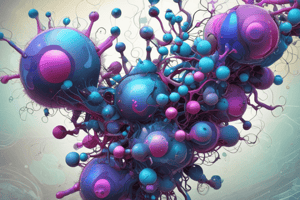Podcast
Questions and Answers
What is the term for the largest dose of a substance that does not cause an adverse effect?
What is the term for the largest dose of a substance that does not cause an adverse effect?
- LOAEL
- DNEL
- NOEL (correct)
- LD50
What is the term for the dose that causes the death of half the laboratory animals subjected to a toxic substance?
What is the term for the dose that causes the death of half the laboratory animals subjected to a toxic substance?
- LD50 (correct)
- NOEL
- DNEL
- LOAEL
What is the term for the level of chemical exposure above which humans should not be exposed?
What is the term for the level of chemical exposure above which humans should not be exposed?
- LD50
- NOEL
- DNEL (correct)
- LOAEL
What is the main focus of Toxicology as a scientific discipline?
What is the main focus of Toxicology as a scientific discipline?
What is the term for the interaction between a living organism and a substance or environmental factor?
What is the term for the interaction between a living organism and a substance or environmental factor?
What is a characteristic of Corrosive Products?
What is a characteristic of Corrosive Products?
What is the term for the physiological reaction of the body to a chemical?
What is the term for the physiological reaction of the body to a chemical?
What is the term for the capacity of a substance to produce deleterious effects on an organism?
What is the term for the capacity of a substance to produce deleterious effects on an organism?
What is an example of a natural source of toxicants?
What is an example of a natural source of toxicants?
What is the factor that determines the intensity of toxic action?
What is the factor that determines the intensity of toxic action?
Flashcards are hidden until you start studying
Study Notes
What is Toxicology?
- Scientific discipline dealing with toxicants
- Focuses on properties, outcome, mode of action, and detection in various environments
- Examines toxics and their impact, understanding their properties and interactions within organisms
What is Toxic/Toxicant?
- A substance that produces a deleterious action on a living organism
- Capable of disrupting the normal functioning of a living organism
- Can come from natural sources (e.g., dust, pollen) or artificial sources (e.g., urea formaldehyde)
- Can have chemical or biological nature
Classification of Chemical Products
- Based on chemical nature, mechanism of toxic action, and other factors
- Types of products include:
- Corrosive products: cause destructive effects on living tissues
- Irritant products: induce itching, redness, and inflammation
- Sensitizing or allergenic products: elicit reactions in predisposed individuals
- Carcinogenic products: may cause cancer or increase its occurrence
- Mutagenic products: induce genetic mutations that can lead to cancer development
- Teratogenic products: can cause malformations in the embryo
What is Toxicity?
- Inherent capacity of a substance to produce deleterious effects on the organism
- Intensity of action depends on administered dose
- Key factors that influence toxic effects:
- Route of administration
- Duration and frequency of exposure
- Dose or concentration
- Increasing doses generally lead to an escalation in intensity and diversity of toxic effects
Key Concepts
- NOEL (No Observed Adverse Effect Level): largest dose that does not cause an adverse effect
- LOAEL (Lowest Observable Adverse Effect Level): lowest dose that causes an observable adverse effect
- LD50 (Lethal Dose 50): dose that causes the death of half the laboratory animals
- DNEL (Derived No-Effect Level): level of chemical exposure above which humans should not be exposed
- Exposure: interaction between a living organism and a substance or environmental factor
- Response: how the body physiologically reacts to a chemical
- Different toxic responses may arise from different routes of exposure, frequencies, and durations of exposure
Studying That Suits You
Use AI to generate personalized quizzes and flashcards to suit your learning preferences.




